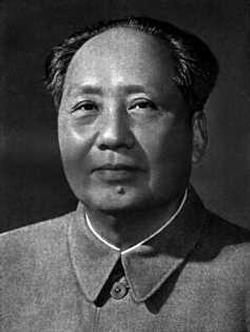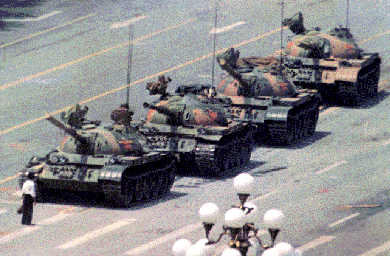|

The rise of Communism in China is largely due to a man named Mao Zedong. On October 1, 1949 Mao Zedong proclaimed the People's Republic of China, declaring, "The Chinese people have stood up". In 1950, with the Communist Party of China in control of the mainland, China was now under Communist control. Mao stepped down from his position as chairman in 1959. Mao still had much influence over the Party, but was removed from day-to-day management of economic affairs, which came under the control of Liu Shaoqi and Deng Xiaoping.
In 1966, Mao and his allies launched the Cultural Revolution, which was a struggle for power within the Communist Party of China that manifested into wide-scale social, political, and economic chaos. In 1972, Mao and Zhou Enlai met Richard Nixon in Beijing to establish relations with the United States and in the same year the PRC was accepted into the United Nations.
 In 1989, the death of pro-reformist, Hu Yaobang, helped to spark the Tiananmen Square protests of 1989, during which students and others campaigned for several months for more democratic rights and freedom of speech. However, they were eventually put down on June 4 when PLA troops and vehicles entered and forcibly cleared the square by opening fire on protesters, resulting in numerous casualties. This event was widely reported and famously videotaped, which brought worldwide condemnation and sanctions against the government. In 1989, the death of pro-reformist, Hu Yaobang, helped to spark the Tiananmen Square protests of 1989, during which students and others campaigned for several months for more democratic rights and freedom of speech. However, they were eventually put down on June 4 when PLA troops and vehicles entered and forcibly cleared the square by opening fire on protesters, resulting in numerous casualties. This event was widely reported and famously videotaped, which brought worldwide condemnation and sanctions against the government.
President Jiang Zemin was elected president, and under Jiang Zemin's ten years of administration, China's economic performance pulled an estimated 150 million peasants out of poverty. For much of China's population, living standards have seen extremely large improvements, and freedom continues to expand, but political controls remain tight. The Constitution of the People's Republic of China states that the "fundamental rights" of citizens include freedom of speech, freedom of the press, the right to a fair trial, freedom of religion, universal suffrage, and property rights. There are always restrictions such as censorship of foul language used against the state. The Communist Party has had mixed success at controlling information. The PRC has a very strong media control system, but an increasingly educated citizenry and cultural change that are making China more open.
|